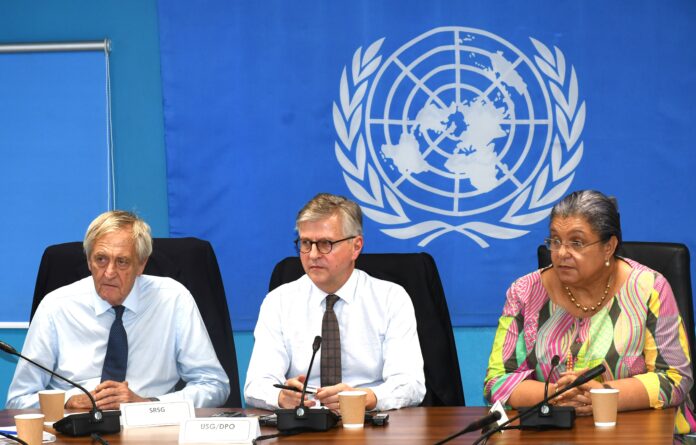
By Otto Abut
The United Nations Mission in South Sudan has emphasised that the forthcoming general election is not an exit strategy for ending peace process.
UMISS top official made the remarks on Friday (February 23rd, 2024) at a press conference held in Juba by the UN Undersecretary General for Peace Operation; Mister Jean Pierre Lacroix and the Secretary-General for the Horn of Africa, Miss Hanna Serwaa Tetteh upon their visit to South Sudan and Abyei which was meant to understand the challenges, security situation and electoral preparations.
UN special envoy of the Secretary-General for the Horn of Africa, Hanna Serwaa Tetteh said the elections would be an important milestone for moving out of a post-conflict phase into consolidating the institutions of state and building a stronger and more inclusive democracy in South Sudan.
“Let me emphasize that elections are not an exit strategy for ending a peace process. They are an important milestone and they mark the opportunity to move forward.
According Tetteh, it would be a very momentous year for South Sudan, indeed if it is possible to hold general elections because it could mark the end of the implementation of the revitalised peace agreement.
She further recommends intercommunity dialogue as one of the essential tools for resolving conflicts being escalated by land disputes and cattle raids.
She said it’s “Not by fighting, not by injuring, not by hurting each other, but by coming together to talk to each other”.
The Special Representative of the Secretary-General (SRSG) and Head of UNMISS Mister Nicholas Haysom said no provisional arrangements have been concretely developed, for refugees to vote and it remains a top question submitted by the UN to the political stakeholders, the political parties, and signatories.
Hysom said UNMISS offered the parties ten critical questions that have to be answered for the elections to take place, such as when will there be voter registration or will they be voted?”
“One of those questions concerns the arrangements for refugees to vote, which is to say that no provision has been concretely developed, but that we put it on the list. And I believe that the political stakeholders, the political parties, and signatories will have to discuss this question.” Hysom reiterated.
The UN head of mission however said the hierarchy should indicate, it contemplates that refugees will be able to vote in either way it would be.
“The question is, in what way will they be required to return to vote? Will there be provision for them to vote where they are” He questioned.
